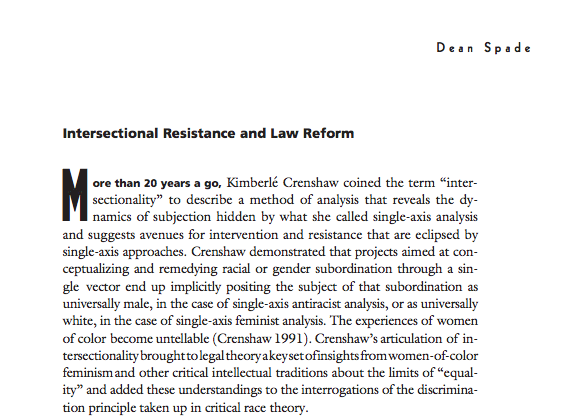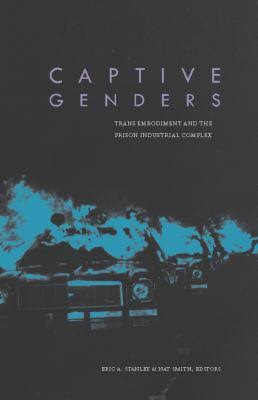I wrote “Under the Cover of Gay Rights,” published in N.Y.U. Review of Law and Social Change in 2013. You can read it here.
I wrote “Under the Cover of Gay Rights,” published in N.Y.U. Review of Law and Social Change in 2013. You can read it here.
I wrote an article called “Intersectional Resistance and Law Reform” in Signs, published in 2013. You can read the full text online here, or download it here.

Abstract:
Critical race theory generally and intersectionality theory in particular have provided scholars and activists with clear accounts of how civil rights reforms centered in the antidiscrimination principle have failed to sufficiently change conditions for those facing the most violent manifestations of settler colonialism, heteropatriarchy, white supremacy, ableism, and xenophobia. These interventions have exposed how the discrimination principle’s reliance on individual harm, intentionality, and universalized categories of identity has made it ineffective at eradicating these forms of harm and violence and has obscured the actual operations of systems of meaning and control that produce maldistribution and targeted violence. This essay pushes this line of thinking an additional step to focus on the racialized-gendered distribution schemes that operate at the population level through programs that declare themselves race and gender neutral but are in fact founded on the production and maintenance of race and gender categories as vectors for distributing life chances. In the context of intensifying criminal and immigration enforcement and wealth disparity, it is essential to turn our attention to what Michel Foucault called “state racism”—the operation of population-level programs that target some for increased security and life chances while marking others for insecurity and premature death. This essay looks at how social movements resisting intersectional state violence are formulating demands (like the abolition of prisons, borders, and poverty) that exceed the narrow confines of the discrimination principle and take administrative systems as adversaries in ways that pull the nation-state form itself into crisis.
The amazing and generous Morgan Ztardust has translated my introduction to the new Against Equality book about hate crime law critiques into Spanish. Thanks, Morgan! You can read it here.
Big thanks to Robert Nichols for interviewing me for Upping the Anti: A Journal of Theory and Action.
I wrote “The Only Way to End Racialized Gender Violence in Prisons is to End Prisons: A Response to Russell Robinson’s Masculinity As Prison,” published by California Law Review Circuit in December 2012. You can read it here.
The new Against Equality book, Prisons Will Not Protect You, has been published! I wrote an introduction for it called “Their Laws Will Never Make Us Safer” about why hate crime laws don’t help queer and trans people, but do build up a police state that targets us.
Learn more about the anthology from Against Equality.
I wrote “Notes Toward Racial and Gender Justice Ally Practice in Legal Academia,” in Presumed Incompetent: The Intersections of Race and Class for Women in Academia, edited by Gabriella Gutierrez y Muhs, Angela P. Harris, Carmen Gonzalez and Yolanda Niemann, and published by Utah University Press in 2012. You can read it here.
 Morgan Bassichis, Alex Lee, and I co-authored “Building an Abolitionist Trans & Queer Movement with Everything We’ve Got” in the anthology Captive Genders: Trans Embodiment and the Prison Industrial Complex, edited by Eric Stanley and Nat Smith. A Mandarin translation is available here: 全力打造一個以廢除為目標的跨性/酷兒運動).
Morgan Bassichis, Alex Lee, and I co-authored “Building an Abolitionist Trans & Queer Movement with Everything We’ve Got” in the anthology Captive Genders: Trans Embodiment and the Prison Industrial Complex, edited by Eric Stanley and Nat Smith. A Mandarin translation is available here: 全力打造一個以廢除為目標的跨性/酷兒運動).
Learn more about Captive Genders here.
I wrote “Laws as Tactics” published in the Columbia Journal of Gender and Law in 2011. You can read it here.
Abstract:
This symposium invites us to consider the impact of Judith Butler’s work on legal scholarship in the area of gender and sexuality. I am interested in reflecting particularly on trans politics and law for two reasons. First, because Butler’s work has had such a significant impact on the emergence of the current iteration of trans politics of the 1990s and 2000s. Second, because I believe there is a great deal more that Butler’s work can offer to significant questions facing trans resistance formations as the field of trans legal rights advocacy institutionalizes and as trans legal scholarship engages and responds to that institutionalization. In particular, I am interested in how Butler’s work has provided analytical models for considering the role that norms and normalization play in both disciplinary and biopolitical modes of governance relating to gender. This analysis is essential to understanding the limitations of certain legal rights frameworks for addressing harms created by racialized and gendered systems of meaning and control.
I wrote “Be Professional!, published in the Harvard Journal of Law and Gender in 2010 in response to Bob Chang and Adrienne Davis’ article, “Making Up Is Hard to Do: Race/Gender/Sexual Orientation in the Law School Classroom,” 33 Harv. J. L. & Gender 1 (2010). You can read it here.
Abstract
In 2010, the Harvard Journal of Law and Gender published a series of letters between Adrienne Davis and Bob Chang entitled, “Making Up Is Hard to Do: Race/Gender/Sexual Orientation in the Law School Classroom,” along with three response pieces by Adele Morrison, Darren Rosenblum and Dean Spade. “Be Professional!” is written in letter form like “Making Up Is Hard to Do” and discusses Spade’s experience becoming and being a trans law professor, as well as broader questions about activism, academia, professionalism and the neo-liberal academy.